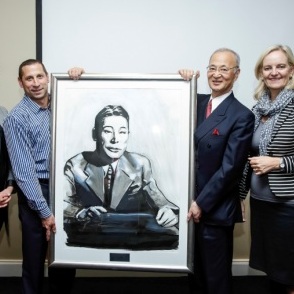Jewish News
Jew-saver Chiune Sugihara, remembered in Johannesburg
Members of the Jewish and Japanese communities, diplomats, business leaders and Holocaust survivors, packed into the Abe Abrahamson Auditorium at Beyachad last Wednesday to remember Chiune Sugihara, the heroic Japanese diplomat who exceeded his authority to issue 6 000 life-saving visas to Jewish refugees during the Second World War.

DAVID SAKS
Pictured: SAJBD President Zev Krengel; Japanese Ambassador Yutaka Yoshizawa; and SAJBD National Chairman Mary Kluk, pose with a portrait of Chiune Sugihara.
The event took place under the combined auspices of the SAJBD Gauteng Council, Embassy of Japan and Johannesburg Holocaust and Genocide Centre.
Among those famously saved from almost certain death at the hands of the Nazis by Sugihara, were most of the members of the Mir Yeshiva, which was able to relocate to Shanghai for the duration of the war. Four of those present at the function were Johannesburg descendants of those survivors, Rabbis Yossy Goldman and Weinberg and Rebbetzens Rochel Ehrman and Chaya Sternstein.
In her message of welcome and introduction SAJBD Diplomatic Liaison Aviva Moses, who headed up the initiative, stressed the enduring example Chiune Sugihara had set by his heroic actions.
In “a period of utter desperation”, he had stood out and shone through the fundamental humanity he displayed, and in today’s turbulent times, it was a lesson the world at large needed more than ever to take to heart.
“No matter what continent we live on, our world is in turmoil. We are bombarded on a daily basis with news of torment, terror, death and destruction. And there has never been a time when is has been more important for every individual to rediscover his or her humanity, because without this intrinsic component of our being, what are we?” she asked rhetorically.
The keynote address was given by Hugh Raichlin, a well-known speaker on Jewish life in countries throughout the world, who recently added Japan to the growing list of places he has lectured on.
In addition to speaking (with accompanying audiovisual material) on the life and achievements of Sugihara, Raichlin gave an overview of the Jewish connection to Japan since the 1860s, combined with entertaining insights into the nature of Japanese society today.
As depicted by him, Sugihara emerged as a genuinely saintly man who to the end refused to take any special credit for what he had done.
Raichlin also stressed the unfailing support provided by Sugihara’s wife, Yukiko, and the crucial involvement of the family of the young Solly Ganor. Excerpts from a video interview with the latter especially arranged for the occasion, were also screened.
Rabbi Goldman and Rabbi Weinberg spoke about their own fathers, both of whom were provided with visas by Sugihara. Rabbi Weinberg said that his father, the only one of 11 siblings who survived the Holocaust, would relate his story to his family on the first night of Chanukah every year.
This had instilled in his children an awareness of how important it was to remember and be grateful to their benefactors. Similarly, Rabbi Goldman’s father was the only survivor of his family in Poland. On his behalf, as well as that of his descendants – among them nearly 80 great-grandchildren, Rabbi Goldman said: “I thank you for the gift of life, for the gift of the generations. G-d bless Mr Sugihara’s precious soul.”
Messages were also given by Japanese Ambassador Yutaka Yoshizawa, SAJBD President Zev Krengel; Holocaust educator and director of the Johannesburg Holocaust and Genocide Centre Tali Nates; and SAJBD National Chairman Mary Kluk.
Ambassador Yoshizawa noted that in Japanese culture, it was at this time of the year that the spirits of one’s ancestors were believed to return, and therefore it was a time when those who had passed away were traditionally remembered. This included remembering both the two million Japanese who had died during the Second World Wa, together with acknowledging the death and suffering Japan had inflicted against others during those years.
Against this background, he said, the legacy of Sugihara shone even brighter.